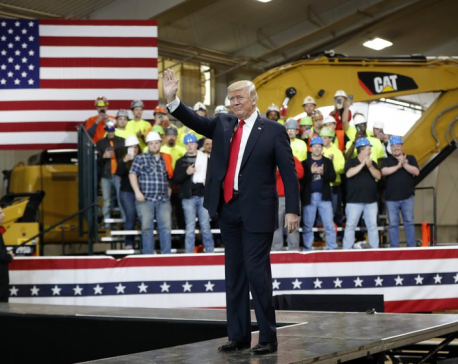
OR
CIAA inaction on NOC
The CIAA’s failure to investigate the wrongdoings of Gopal Khadka, the controversial chief of Nepal Oil Corporation (NOC)—even though the media has unearthed reams of evidence of his involvement in corruption, the evidence that was moreover corroborated by a parliamentary committee—is rather disquieting. It is dispiriting too. A lot of hard work goes into the kind of rigorous investigative stories that Nepal Republic Media and other media houses have been running on high-level corruption in NOC. No one has thus far been able to credibly refute those stories. Yet Khadka is not just a free man, by the looks of things he could even be restored as NOC’s managing director following a Supreme Court order. The CIAA’s continued inaction is making a mockery of rule of law and promoting impunity. After the directive from the sovereign parliament, the anti-graft body is obliged to investigate Khadka and if he is found guilty, to file a criminal case against him. But despite repeated assurances that it is indeed looking into the case, in fact, the CIAA has done precious little.
Why do we need a constitutional anti-corruption body like the CIAA if it is to be a mute spectator while corruption in high places is rampant? During the reign of Lokman Singh Karki, the CIAA had become a political tool, which Karki used to endlessly hound his critics, in the process doing big disfavor to the clean and impartial image of the country’s chief anti-corruption body. It is not a coincidence that since 2007 the CIAA has failed to successfully prosecute even one high-ranking government official, even though all evidence suggests that level of corruption in Nepal is increasing. Just like other state organs, the CIAA too has been badly politicized. Following the dismissal of Karki as CIAA chief, our major political parties, it seems, are determined to keep the CIAA weak and ineffective. Since there are corrupt elements in all our major parties, the deliberate weakening of the CIAA is almost a case of corruption by consensus. But if the CIAA fails to act freely and independently, then the country’s anti-corruption crusade is pretty much doomed.
But the likes of Khadka and Sajha Prakashan’s Dolendra Prasad Sharma, whose exploits as Sajha chief are no less shameful, also discredit the government they are a part of. Be it KP Sharma Oli or Pushpa Kamal Dahal or now Sher Bahadur Deuba, as government heads they all seemed to look the other way, if not abet, high-level corruption. Thus, whatever their other merits, these governments came to be seen as corrupt. There is a risk that people will be so put off by this pervasive culture of corruption they will start looking for alternatives to multiparty democracy, and hanker after a strongman who is seemingly capable of doing away with the scourge with one decisive order. Otherwise, only when our judiciary and anti-corruption agencies are strong and independent can they be expected to uphold rule of law and ensure effective check and balance, two indispensible traits of a functioning democracy. In the NOC case, the CIAA’s prolonged inaction is inexcusable. It is also undemocratic.
You May Like This

Trump warns he may freeze SKorea trade deal for NKorea talks
RICHFIELD, March 30: President Donald Trump on Thursday threatened to hold up the trade agreement his administration finalized this week with... Read More...

Even the eyelashes freeze: Russia sees minus 67 degrees Celsius
Highlight: In Yakutia — a region of 1 million people about 3,300 miles (5,300 kilometers) east of Moscow — students... Read More...

Two freeze to death in Saptari
RAJBIRAJ, Jan 7: Two people have died in Saptari district on Saturday due to excessive cold brought by a cold... Read More...




Just In
- MoHP cautions docs working in govt hospitals not to work in private ones
- Over 400,000 tourists visited Mustang by road last year
- 19 hydropower projects to be showcased at investment summit
- Global oil and gold prices surge as Israel retaliates against Iran
- Sajha Yatayat cancels CEO appointment process for lack of candidates
- Govt padlocks Nepal Scouts’ property illegally occupied by NC lawmaker Deepak Khadka
- FWEAN meets with President Paudel to solicit support for women entrepreneurship
- Koshi provincial assembly passes resolution motion calling for special session by majority votes







_20220508065243.jpg)






Leave A Comment